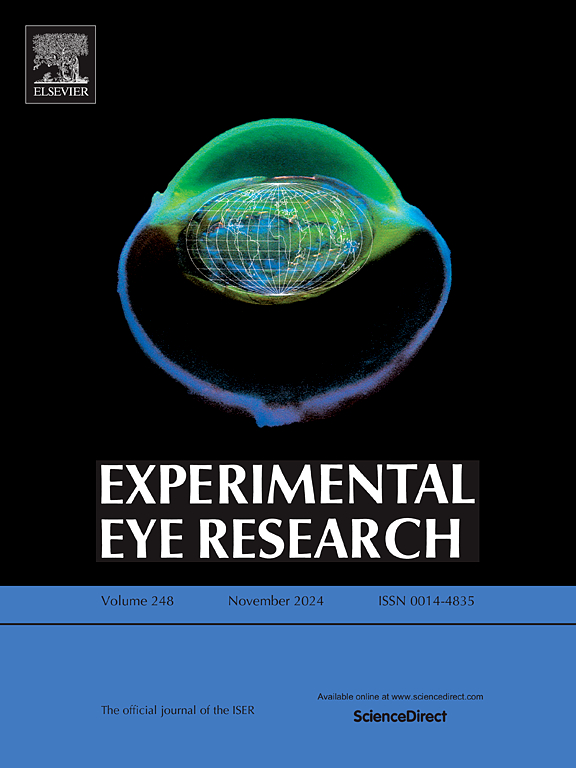电针通过CREB/BDNF/TrkB途径改善单眼剥夺幼鼠V1皮层突触可塑性
IF 3
2区 医学
Q1 OPHTHALMOLOGY
引用次数: 0
摘要
本研究旨在探讨CREB/BDNF/TrkB信号通路对接受单眼剥夺(MD)的幼年弱视大鼠视皮层突触可塑性的影响。本研究涉及60只2周大的Sprague-Dawley(SD)幼年大鼠,这些大鼠没有性别区分。在第一部分研究中,24只大鼠被随机分为对照组和MD组;在第二部分研究中,36只大鼠被随机分为MD组、电针(EA)组和EA+CREB拮抗剂(666-15)组。MD 模型采用单眼缝合法。单眼缝合 14 天后开始电针治疗,每天 30 分钟,频率为 2-10 Hz,强度为 1 mA,持续 2 周。根据第一部分的结果,与对照组相比,MD 组的 P100 波潜伏期延长,波幅降低。此外,MD组V1皮层的神经元数量减少,CREB、BDNF、p-TrkB、关键可塑性蛋白PSD95和SYN的表达水平降低。在第二部分中,EA治疗明显提高了V1皮层神经元的电生理活性,不同程度地缩短了P100峰的潜伏期,振幅明显增大,神经元的形态和结构恢复到正常水平;突触蛋白PSD95和SYN的表达以及信号分子CREB、BDNF和p-TrkB蛋白的表达均有所增加。然而,在使用特异性 CREB 抑制剂 666-16 后,EA 的作用被逆转。这些数据表明,EA通过调节CREB/BDNF/TrkB信号通路的表达,增强了V1皮层突触可塑性相关蛋白的表达,从而增强了V1神经突触可塑性,逆转了MD对视敏度的影响。本文章由计算机程序翻译,如有差异,请以英文原文为准。
Electroacupuncture improves V1 cortex synaptic plasticity via the CREB/BDNF/TrkB pathway in juvenile rats with monocular deprivation
The present study aims to investigate the impact of the CREB/BDNF/TrkB signaling pathway on synaptic plasticity in the visual cortex of juvenile amblyopic rats that have undergone monocular deprivation (MD). This study involved sixty 2-week-old Sprague-Dawley (SD) juvenile rats, which were not specified by gender. In the first part of the study, 24 rats were randomized into control and MD groups; In the second part, 36 rats were randomized into MD, electroacupuncture (EA) and EA + CREB antagonist (666–15) groups. The MD model was established using the monocular suture method. 14 d after monocular suture, EA treatment was started for 30 min daily, at a frequency of 2–10 Hz and an intensity of 1 mA, for 2 weeks. According to the results from part 1, the P100 wave latency in the MD group was prolonged, and its amplitude was lower compared to the control group. Additionally, the neuron number in the V1 cortex of the MD group decreased, along with reduced expression levels of CREB, BDNF, p-TrkB, and the key plasticity proteins PSD95 and SYN. In part 2, EA treatment significantly increased the electrophysiological activity of neurons in V1 cortex, shortened the latency of P100 peaks to varying degrees, increased the amplitude significantly, and restored the morphology and structure of neurons to normal levels; The expression of synaptic proteins PSD95 and SYN, as well as the expression of signaling molecules CREB, BDNF, and p-TrkB proteins were increased. However, the effects of EA were reversed when the specific CREB inhibitor 666–16 was administered. These data indicate that EA enhances the expression of V1 cortical synaptic plasticity-related proteins by regulating the expression of CREB/BDNF/TrkB signaling pathway, thereby enhancing V1 neural synaptic plasticity and reversing the effects of MD on visual acuity.
求助全文
通过发布文献求助,成功后即可免费获取论文全文。
去求助
来源期刊

Experimental eye research
医学-眼科学
CiteScore
6.80
自引率
5.90%
发文量
323
审稿时长
66 days
期刊介绍:
The primary goal of Experimental Eye Research is to publish original research papers on all aspects of experimental biology of the eye and ocular tissues that seek to define the mechanisms of normal function and/or disease. Studies of ocular tissues that encompass the disciplines of cell biology, developmental biology, genetics, molecular biology, physiology, biochemistry, biophysics, immunology or microbiology are most welcomed. Manuscripts that are purely clinical or in a surgical area of ophthalmology are not appropriate for submission to Experimental Eye Research and if received will be returned without review.
 求助内容:
求助内容: 应助结果提醒方式:
应助结果提醒方式:


